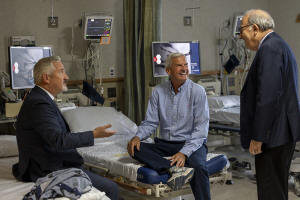Keeping blood pressure under control is critical. There's a new option
for tough cases
 Send a link to a friend
Send a link to a friend
 [January 20, 2025]
By LAURAN NEERGAARD [January 20, 2025]
By LAURAN NEERGAARD
WASHINGTON (AP) — Nothing doctors prescribed controlled Michael
Garrity’s dangerously high blood pressure — until they zapped away some
nerves on his kidneys.
If that sounds weird, well, kidneys help regulate blood pressure in part
through signals from certain nerves. The new treatment disrupts
overactive renal nerves.
“My blood pressure would spike and I’d run out of breath and feel tired,
and that doesn’t happen anymore,” said Garrity, 62, of Needham,
Massachusetts. He still takes medicine but at lower doses, his blood
pressure normal for the first time in years. “I’m thrilled.”
About half of U.S. adults have high blood pressure, a major risk for
heart attacks, strokes, kidney failure, even dementia. Many people don’t
even realize they have hypertension until it’s done serious damage.
“Know your blood pressure, know the numbers,” stressed Dr. Randy Zusman
of Massachusetts General Hospital, who specializes in the
hardest-to-treat cases and advises people who think they’re fine to at
least get a yearly check.
And only a fraction of patients have their hypertension well-controlled,
meaning there’s a need for novel strategies. The Food and Drug
Administration approved that “renal denervation” option about a year
ago, based on studies showing a modest benefit in patients whose blood
pressure remains high despite multiple medicines.
Now, after the American Heart Association recently deemed it promising,
some hospitals including Mass General Brigham are cautiously offering it
as they work out who are good candidates — and whether their insurance
will cover a minimally invasive procedure costing thousands of dollars.

What is high blood pressure?
Two numbers describe blood pressure. The top, “systolic” pressure, is
the force blood puts on the walls of arteries as its pumped out of the
heart. The bottom “diastolic” number measures that same pressure but
between heartbeats.
Normal is less than 120 over 80. Blood pressure naturally fluctuates
throughout the day, higher when you’re physically active or stressed.
But when it stays high — consistently 130 over 80 or higher, according
to the most recent guidelines — it stiffens arteries and makes the heart
work harder.
How to measure blood pressure
It doesn’t take a doctor’s visit. Pharmacies and sometimes even
libraries offer screening, and people can use at-home monitors.
To avoid falsely high readings, the American Medical Association has
tips: Sit quietly with feet on the floor, legs not crossed. Place the
cuff on a bare arm, not over clothing. Don’t dangle the arm — rest it on
a table.
[to top of second column]
|

In this photo provided by Massachusetts General Hospital, patient
Mike Garrity, center, speaks with Drs. Joe Garasic, left, and Randy
Zusman in Boston, on Sept. 25, 2024. (Jeffrey Andree/Massachusetts
General Hospital via AP)
 Drugs aren’t the only way to
treat high blood pressure
Lifestyle changes are the first step, especially for otherwise
healthy people. Guidelines urge losing weight, exercise, eating more
fruits and vegetables, limiting salt and alcohol, and taking steps
to handle stress.
Medicine is a must once hypertension reaches 140 over 90. The
average patient requires two or three drugs, sometimes more, along
with healthier living, Zusman said.
But the hypertension Garrity has struggled with since his late 20s
is treatment-resistant. Despite taking four to six drugs plus a
strict diet and exercise, his blood pressure regularly reached 150
over 100 or worse.
What is renal denervation?
Doctors thread a small catheter, or tube, through blood vessels to
reach the kidneys, and then beam in ultrasound or radiofrequency
energy. Those pulses pass through the renal arteries to selectively
target surrounding nerves, said Dr. Joseph Garasic, a Mass General
interventional cardiologist who performed Garrity’s procedure. It
takes about an hour.
Although already used in other countries, a key U.S. trial of renal
denervation failed about a decade ago, prompting changes before
researchers tried again. In November 2023, the FDA approved two
catheter systems, from Recor Medical and Medtronic.
It’s not a cure – and some patients get no benefit. But Garasic said
multiple studies show on average an 8 to 10-point drop in blood
pressure, a modest but important improvement. Some like Garrity see
a bigger drop, enough to gradually scale back medications.
The FDA deemed the procedure safe for carefully chosen patients — it
wasn’t tested in those with kidney disease or narrowed arteries, for
example. And studies have lasted only a few years, not long enough
to tell if the nerves might eventually regenerate.
Guidance from the American Heart Association urges would-be patients
and experienced doctors to have “thoughtful and informed
discussions” to decide who’s a good candidate.
All contents © copyright 2025 Associated Press. All rights reserved
 |